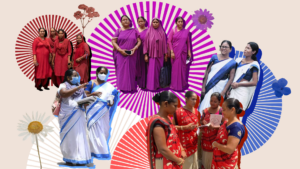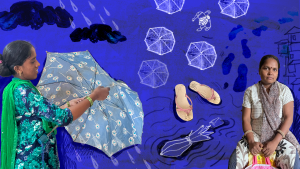What Beauty Parlours In Jharkhand Villages Tell Us About Gender, Caste And Hope
Parlours are small pockets of rebellion and assertion where girls and young women find solidarity in small towns and villages
- Ankita Apurva
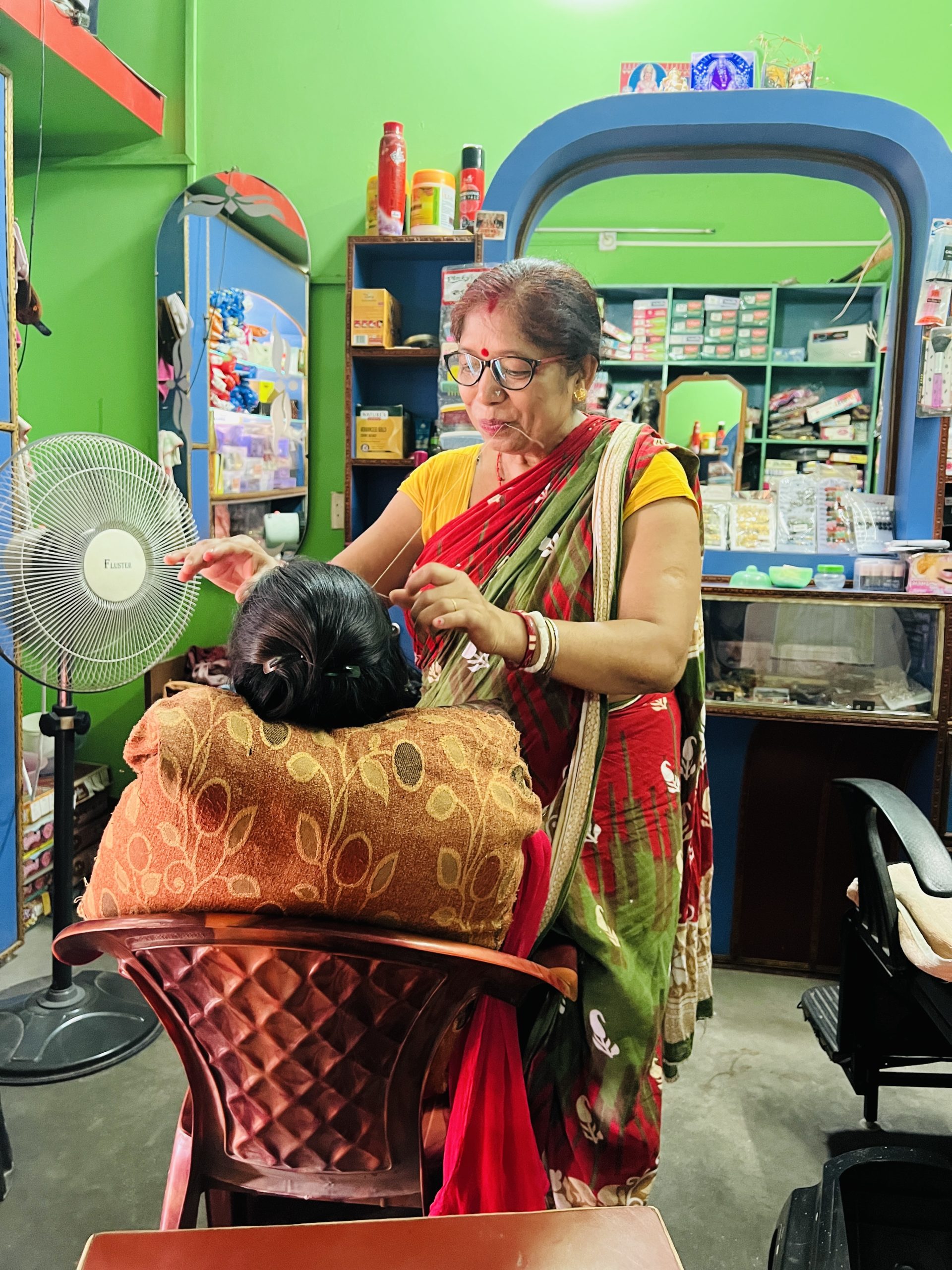
“My parlour customers often request me to finish their work quickly, saying they have yet to get their goats back home,” says Shiuli Mitra with a chuckle as she moves from one customer to another, threading their eyebrows. The beautician, dressed in a plain cotton sari and her face makeup free, is from the Moira community of Bengali sweet-makers.
Mitra’s parlour, built in the early 2000s in Silli village of Ranchi district, is on a plot where her mother-in-law’s hut once stood. The air-conditioned parlour, a rare luxury in rural Jharkhand, is located in the verandah of the family home.
I visit Mitra at her parlour on a Thursday afternoon. Her clientele ranges from women who carry bricks and sand at construction sites in Ranchi district to those who gather firewood from the neighbouring forests to sell in the market. Every time they step out of their homes, the women carry the burden of their family’s “honour”: how they dress or behave in the outside world is determined by this image.
I have been visiting beauty parlours in rural, semi-rural and semi-urban pockets of Jharkhand with the women of my family since I was a child. I have always found these parlours to be small pockets of rebellion and assertion. Here, young girls who had been instructed to keep their heads down and their tongues quiet, find the freedom to giggle as they get their hair trimmed minimally so their families would not notice. Perhaps the trim would not be visible if they were to wear their hair in two braids?
As they get their legs waxed on the torn seats of parlour chairs, often with foam spilling out of covers, they talk about going to a friend’s birthday party in a black dress. To a room full of enraptured strangers, they describe how they hide the dress under the History books and then leave home wearing a loose salwar-kameez. Later, inside the washroom of their college canteen, they hastily change and tuck the salwar kameez among the books.
It is mid-July, and the monsoon has yet to arrive in these villages though other parts of northern and western India are marooned in floodwaters. Sowing hasn’t begun yet, the farms are empty, and the saplings prepared by farmers are wilting.
Rare Refuge
Most parlours stand in spaces where homes have been turned into shops over time. Some share a wall with male-dominated homes, separated by just a wall or a curtain. In these setups, it is not unusual for the women to be frequently summoned inside in the middle of work to entertain guests or do various chores. In one case, a beautician was interrupted so often she could not find the time to work or be photographed. Was her refusal to be photographed also a way to protect her husband’s ego, I wondered.
In these small-town, rural pockets, women do not get to demand leisure time. They do not go out, eat out, “take a break”, find “me-time” or demand space to “focus” on themselves. And where else but in a parlour can they get to sit with their legs falling apart as they relax? These salons hold the deepest secrets of women, complaints and thoughts which, if fate forbid, reaches their husbands or in-laws could result in abandonment, thrashing, and even murder.
At Mitra’s parlour, customers share an easy camaraderie. Saloni, a young customer dressed in a trendy white crop top and a pair of loose, high-waisted pants enters and touches the beautician’s feet, the norm here when you meet someone older. Her meticulously braided hair circling her face, Saloni starts chatting with the others about how she had once come to the parlour after shopping for a bucket and had gone home to find that it did not fit her mother’s expectations.
It is also a custom to take off one’s slippers outside before entering these parlours. “Often, customers count the number of slippers before they enter to ascertain the crowd inside,” says Mitra with a laugh.
Independence, Mobility, ‘Reputation’
The beauticians here source products from the neighbouring towns. Despite their small profit margins, they have managed to boost household earnings, they tell me. “Today, I earn more than my husband and have been able to send my son to Latvia to pursue hotel management. It is a beautiful country,” says Mitra. “COVID destroyed his career prospects there, but I still aim to expand my business gradually. I have decided to open a shop that sells readymades right next to my parlour. My son can run it and settle here with his wife.”
Heeramani Tirkey, too, is the sole earner of her family. Her parlour is a cramped, one-room arrangement on the outskirts of Ranchi, a small town that became a state capital when Jharkhand became a new state barely two decades ago, in 2000. The paint on the asbestos roof of the salon has worn off, and it now looks more brown than grey. The name ‘Heena Beauty Parlour’ is hand-painted and misspelt in red on a dusty wall outside. A table fan sits before the dressing mirror and, just like the tube light above, works in tandem with the sudden but regular disappearances of the power supply. But Tirkey, a Christian convert from a Scheduled Tribe community, remains unflappable.
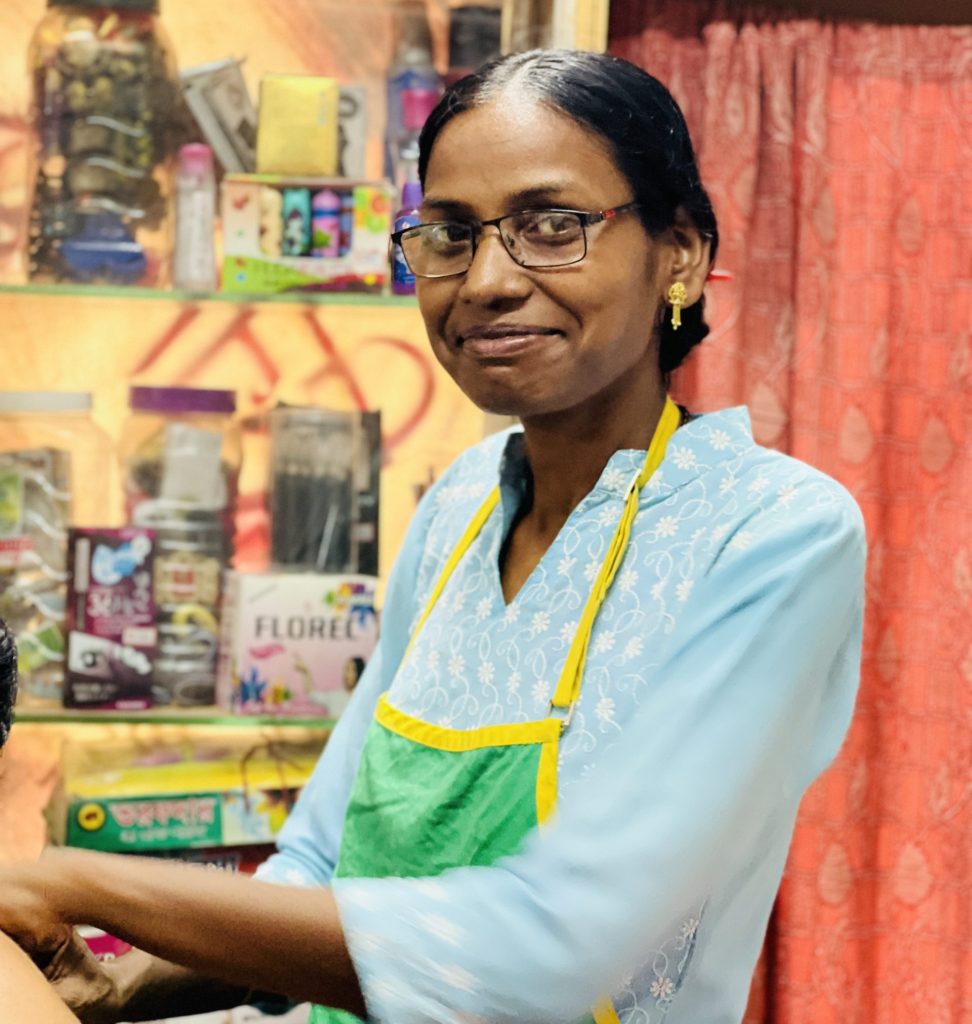
“Do families send you a vehicle to go to the wedding venue to do bridal make up or do you have to arrange for your own travel?” I ask. “I won’t sit on a bike with any man to go to these homes. If anyone has a car and sends it, then I go. If not, I pay the auto-fare myself and go,” she says firmly, asserting the idea that “purity” is more important than safety. “Money is not the big thing, but reputation is.”
Female access to vehicle ownership or mobility is still rare here. “I don’t take on weddings that are far away. Also, some communities such as yours(Kurmis) have late night weddings that won’t allow me to return till 8 or 9pm,” she tells me. There is also the fear of the elephants who live in the forests that flank the roads between villages. So, even if it means losing out on a bridal deal, she sometimes opts to go only for receptions. “I have to consider my honour, too. I can’t return home at midnight or stay elsewhere overnight,” she says.
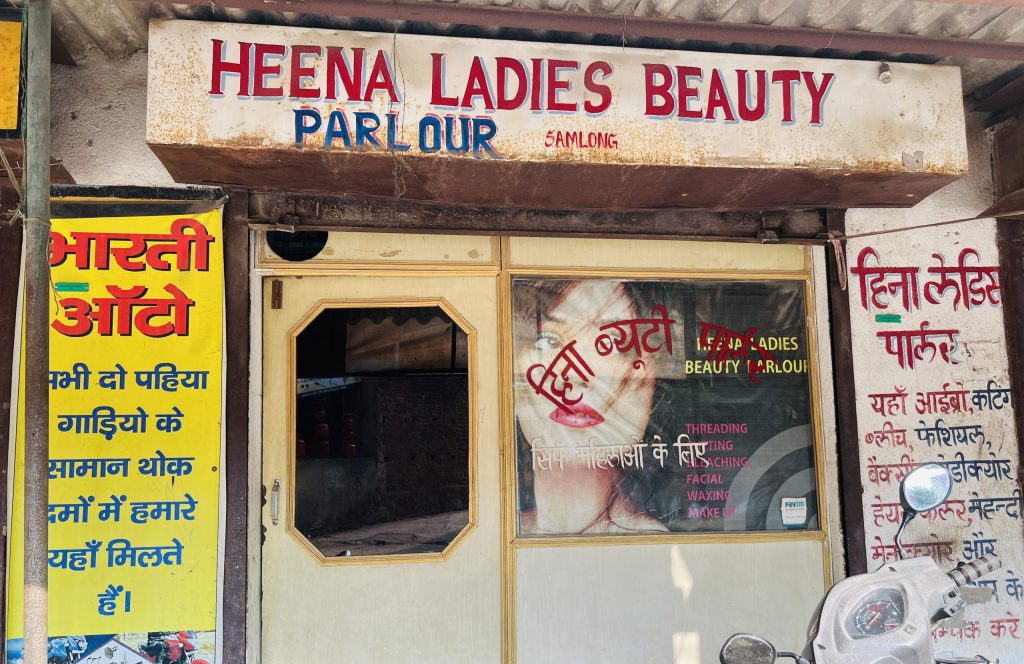
A young woman who appears to be in her early 20s walks into Mitra’s parlour and asks her to do her eyebrows. She is in a hurry to get back home to her one-year-old baby. As per the National Family Health Survey (NFHS) 6 for Jharkhand, almost 32% of women below the age of 18 years and 54.6% below 21 years of age had been married at the time of the survey.
“Can I click your picture while you are doing your work?” I ask Mitra.
“My face is not presentable at the moment. Shall I cover myself more?” she asks though she is wearing a sari. I assure her of her beauty and my camera quality. And she remarks while laughing that she is not beautiful.
Confessor Figures
Tirkey is a confessor figure to many of her customers. “Once, I casually asked a customer how she was doing, and she started crying because she had lost her husband to Covid. Another time, someone started wailing about her husband’s extramarital affairs and how he abused her,” Tirkey tells me on a pre-monsoon afternoon.
A day earlier, when I had asked my mother what time would be the best time to visit the parlour to talk to the owner, she replied instantly: “Afternoon. That is when most women are busy cooking and serving lunch to their husbands, in-laws and children. So the parlour would be empty.”
Tirkey says that in many homes, women are treated with little respect but divorce or separation are not options in her – or their – book. “Some women tell me they do not want to live any more but have to carry on for the sake of their children and parents. These things [extra marital affairs] are happening in all castes, and some women too have extramarital affairs.”
Escaping Patriarchal Norms
Tirkey’s parlour has a tiny separation marked by a faded curtain where women change into nighties to get a facial. This is one place where the women undress with ease unlike their homes where the act is either a part of a hasty bath timed for the family’s convenience or a prelude to spousal intimacy that is often forced.
A lot of customers come to the parlour only so they can talk on their mobile phones. At home or on the road, a girl conversing on a mobile phone is looked at with suspicion or disapproval and shamed. So, they often schedule their calls during parlour visits. Only 49% women in Jharkhand own mobile phones that they themselves use, as per the latest NFHS-5 data.
“There are several women who are not allowed to visit their parental home post-marriage. There are married customers who are educated and employed. But when they step out of home, they have to be chaperoned by their mothers-in-law. Otherwise, she has to seek her mother-in-law’s permission and answer many questions about where she is going, why, and for how long,” says Tirkey.
These parlours do not follow the system of appointments and work on a first-come, first-served basis. “There are times when a woman who has been waiting for her turn for hours has to get up and leave because she gets a call summoning her home. And when they get home, they are interrogated on why they were out so long,” says Tirkey.
She says that many of her customers are the first in their families to visit a parlour. Many of them are young students or women who are the first in their families to start earning, and they could be school teachers or daily wagers.
On the street outside, men can often be found sitting around playing cards and holding forth on politics and every subject under the sun with supreme confidence. But the women from their families are not allowed to have a say, not on who they would like to marry or on the number of children they want to have.
Tirkey is okay with women seeking beauty treatments but she would like them to not cross certain conventional social boundaries – she is firm about women respecting rules of chastity, for instance. She complains that “pure” relationships between men and women are a thing of the past. “Nowadays, everything begins with a romantic relationship. Not all girls do ‘such things’, though. Those who do think that they can do whatever they wish, and whatever they feel is right. That it is their own body,” she remarks derisively, and then states with approval, “Though some girls are loyal to the notions of staying pure.”
“Can I click your picture?” I ask her. “The photo won’t come nice now,” she replies, even as she gets ready to pose. I show her the photographs I take and she beams with joy at what she sees.
‘Beauty Business Was Considered Menial’
In a parlour with no door of its own but one shared with a home and opening onto a road, Vinita Sahu has been running a small parlour since 1995. At that time, it was the first parlour in rural Ranchi. She recalls that people would be insulting about her work.
“When I had started, my father-in-law had commented that once you start doing this work, you will have to cut the hair of ‘lowly castes’ (Scheduled Caste communities) too, of those who wash our utensils,” says Bina Sahu*, a parlour owner who belongs to the merchant caste. “I didn’t pay much attention to him and replied that when a doctor learns to treat, he doesn’t discriminate between patients. My in-laws used to taunt me, declaring that I was doing menial work. Even today, my relatives do not like that I do this work, and they keep pointing out that I cook with the same hands that I use to cut hair.”
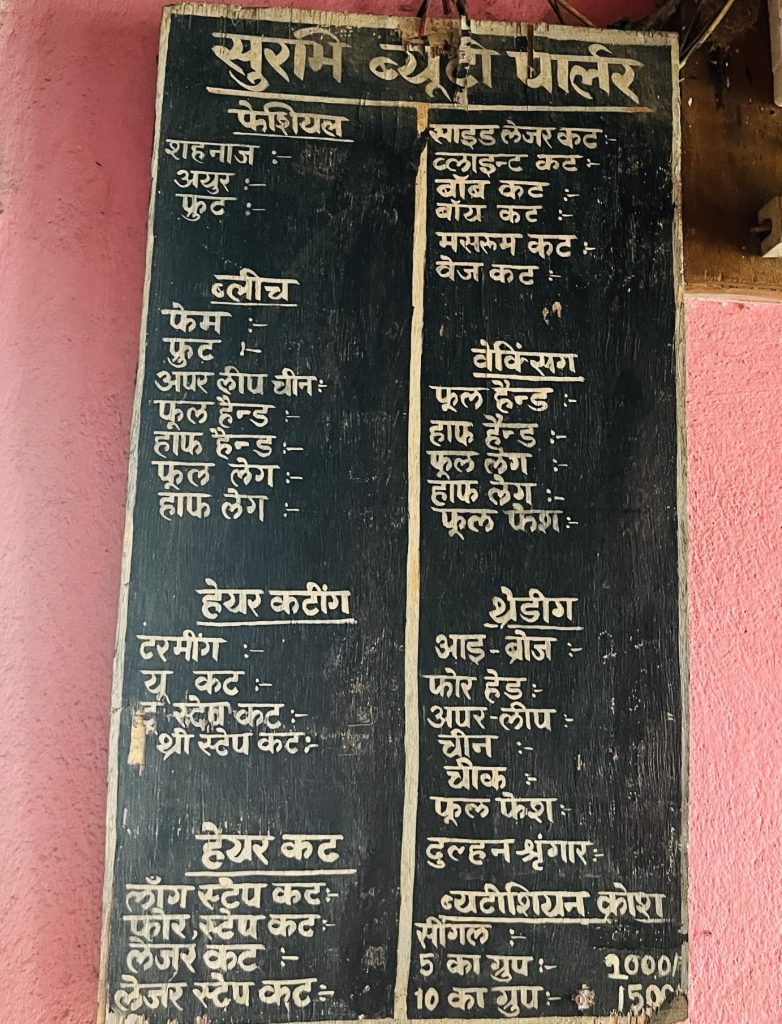
Vinita Sahu recalls being ashamed to even ask her clients for payment. “I started by asking for Rs 6 for threading eyebrows. For a facial, I would only charge Rs 50,” she said.
But Bina is more than aware that times are changing, as is her customer base. “Those who served us earlier are the ones coming for facials and bringing us money. They pay with a lot of respect because, for them, going to a parlour is something new and exceptional. They feel highly esteemed when they get a [beauty] treatment done. But the privileged don’t have that attitude.”
As a child, I remember a Muslim woman walking into a parlour to get a facial. Once done, she paid, put her burqa back on and left, and as soon as the door closed, other women pointed out that she was hiding her freshly done face behind a veil.
Bias In Beauty
There is also a lot of body shaming in these parlours, where women stare openly at those who are of a darker skin tone or are plus-sized. This time too, when I walked into Heeramani Tirkey’s parlour, someone asked me what I had come for. When I said I came for other reasons, she said: “Yes, you are beautiful like this only. Why would you need to get anything done?” Had I been three sizes bigger, or if the melanin in my skin had been a few shades richer, how would she have responded?
Another acquaintance from a small town in Uttar Pradesh told me: “I wanted to get my hair cut really short to reaffirm my queer identity. The parlour people not only made me feel extremely under-confident with their comments, but they also made me feel ugly.”
I ask Mousomi* Mitra, another beautician, if she goes to the homes of those from other castes and communities for bridal makeup.”Yes, all communities,” she replies. But then adds, “I have even gone to a Musalmaan’s house. But I haven’t ever been asked to go to the homes of the lower castes, such as the Ghasi, Mochi and Chamar communities. They don’t usually book me to do their make-up, and it is not possible to go to their place either. But if they come to my parlour, I do service them. Even if given lakhs of rupees, I won’t go to their house because, see, I am a pure Bengali, and if I do go there, everyone else will ostracise me. But those from these communities who hold proper jobs, have money, people have no problem touching them, going to their weddings.”
In all the parlours I visited, my caste always came up in conversations.”The maximum my clients get done are eyebrows and facials. People in villages work with cow-dung in and around their homes as well as in fields. They cannot worry about their feet,” says Sunita Devi, who runs a parlour in rural Jharkhand. Sunita is from the Kurmi caste that is engaged in farming. She has rented two rooms out of which she runs a tailoring unit and sells assorted merchandise and services – face creams, bangles and cosmetics and jewellery.
Learning The Ropes
Sunita Devi has a young tailoring trainee, Laksmi Kumari, who is around 18 years of age. She is listening to us as she learns how to cut fabric for blouses by practising on paper. Lakshmi wears a floral-printed pastel shade salwar-kameez and lipstick, a rare thing in these parts. It seems to speak of bodily autonomy and financial independence.
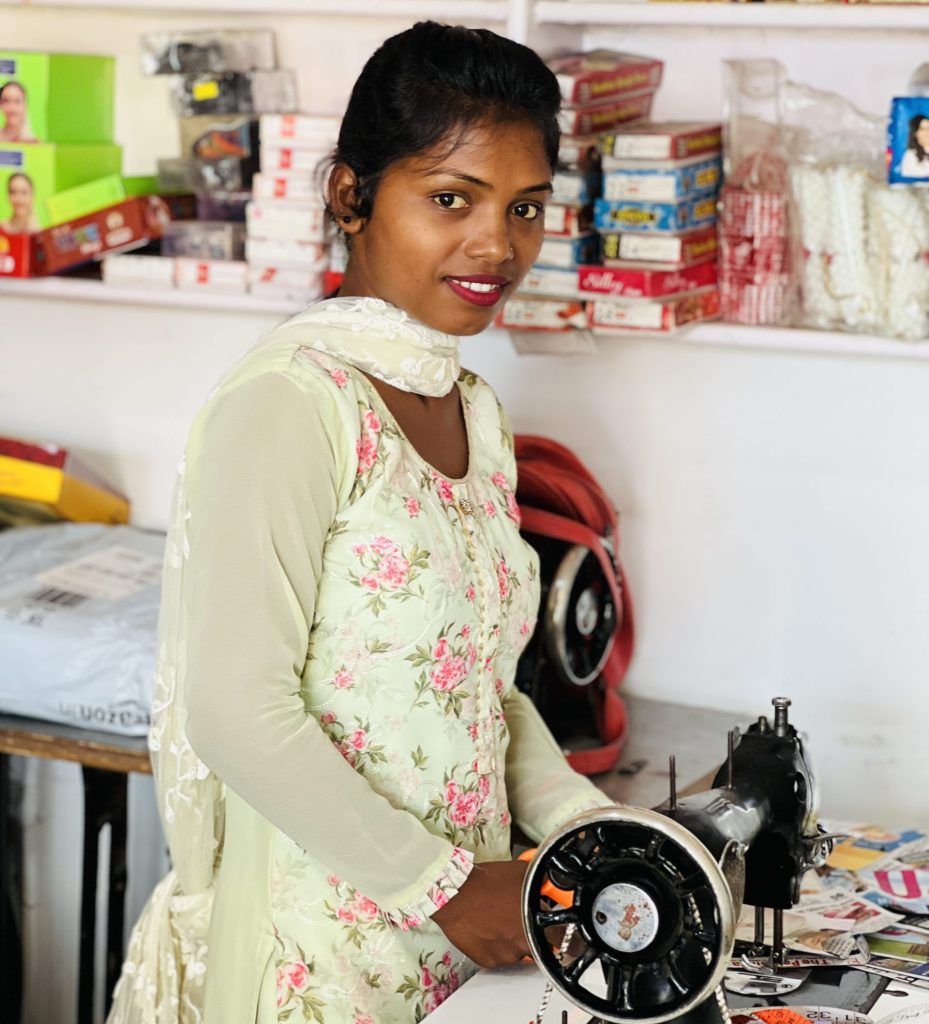
Devi occasionally lapses in broken English. She is open to getting clicked wherever I request her to pose. Laksmi giggles and poses shyly for the camera. We all chuckle at the situation. The parlour is very clean, and every object is in its place. The mirror is decorated with plastic flowers and leaves. I compliment her on this, and Sunita replies: “I have tried to make it beautiful. There is still some work left. The business needs to flourish before I can spend more. This is just the beginning. The lighting is yet to reach.”
“Would you hire women from any community to work in your shop?” I ask her. “Yes, whoever does good work, and whoever needs financial help, I hire them. Any individual, especially women, should definitely be independent. The teacher I had learned from used to earn more than her husband and motivated us all so much to work hard.” All of these women are excited to share how over the years, they have taught thousands of women in skilling camps run by NGOs and other organisations.
Parlours here also sell items of interest to women customers. Sanitary napkins can be bought here without any embarrassment. You could also buy fake hair buns to give volume to your hair or pretty hair clips for children.
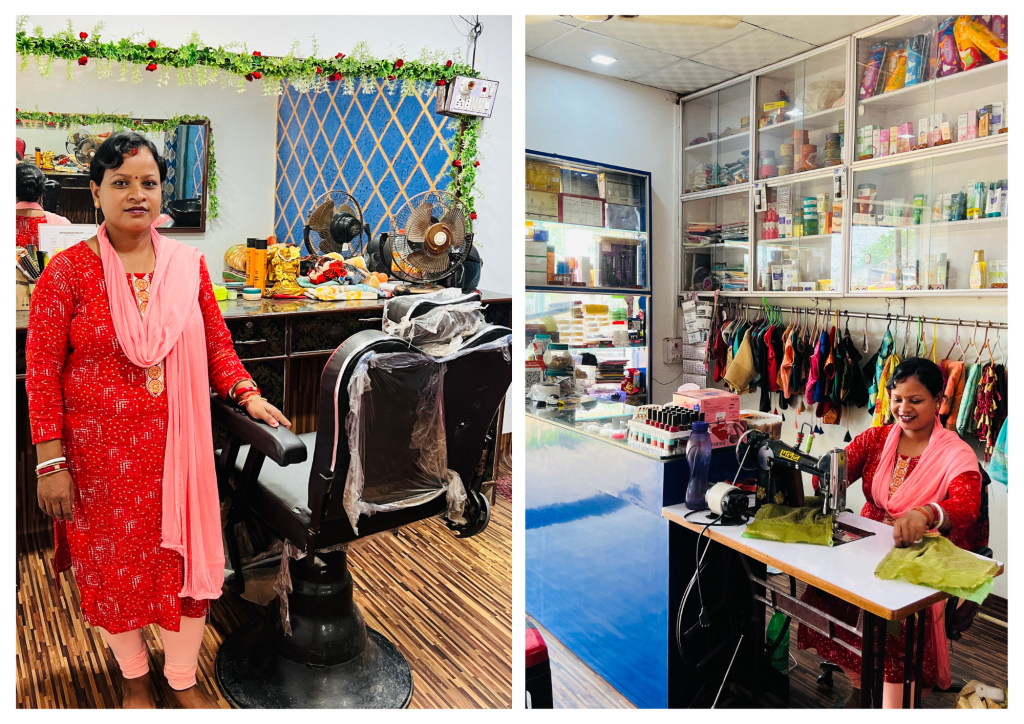
“Has a trans woman ever visited your parlour?” I ask several of these women. “They come to take money. They sing and bless. But no, never have they come for a treatment, though they have bought some items from here.” I ask if they have ever had trans women as students anywhere. “No, never, but I have had disabled students.”
Like all business owners, these women too, face customers of all kinds. Tirkey tells me that while some are immensely soft-spoken, there are those who squabble over price or service. But she is also thrilled with the love, respect and attention she gets.
“I am a celebrities,” Tirkey says. The grammar might be misplaced, not the emotion.
[*Some names have been changed to protect identities.]
We believe everyone deserves equal access to accurate news. Support from our readers enables us to keep our journalism open and free for everyone, all over the world.

